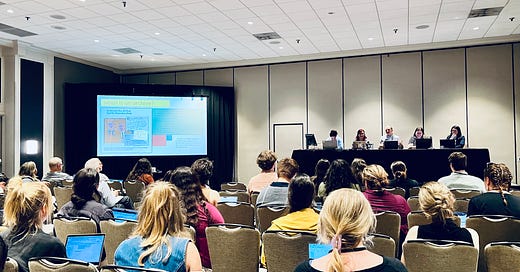Letter From New Orleans: The Wrap-Up
Demented merry-go-round. Documenting history. Saving the truth.
It’s time to wrap up my letters from New Orleans. I’m heading back to Los Angeles on Sunday, and I’ll have no time to seriously ponder and write. Not that things are perfect on the 28th floor of the New Orleans Marriott Hotel on Canal Street… Every morning, for the past three days, I’ve been woken up by what sounds like an extremely loud, and demented, merry-go-round. It goes on and on for at least thirty minutes, maybe even an hour, and I feel like I’m living in a deranged horror movie with a homicidal doll lurking in the shadows, readying itself to slit my throat. I still haven’t figured out where that psycho music is coming from, but, thankfully, the rest of the day goes much better.
Anyhow, on Saturday, things were winding down at the Investigative Reporters & Editors conference, and I was quietly excited to attend one of my last panel sessions: “Finding and using historical documents in investigative stories.” I wasn’t excited because it was one of my last. I was excited because I love tracking stuff down (read my deep dive into the American artist Jean-Michel Basquiat), and I wanted to learn more ways to do it.
Now finding specific historical documents for specific reasons for a specific story is rarely easy, and only a certain kind of person thinks that such a grueling, bleary-eyed search is actually fun.
Usually that person has a freaky amount of patience, curiosity, creativity, and persistence. He or she also tends to be a bit obsessive. And they don’t mind being alone for hours, reading and sorting and trying to figure things out.
I, of course, just happen to be one of those people.
What many people may find boring, even painful, I find exhilarating, especially when I’m trying to track down a dark truth about a corrupt politician or a greedy company or a nasty lobbying group that does the dirty work for a greedy company (read my investigation into the California Apartment Association). And when I find that dark truth, I get a kind of righteous buzz that lasts for hours, which makes me want to find more dark truths.
So the panelists, all of whom were great (Cam Rodriguez of the New York Times, Nadia Hamdan of the Center for Investigative Reporting, Alexia Fernández Campbell of the Bloomberg Industry Group, Steve Eder of the New York Times, and independent investigative reporter Mc Nelly Torres), walked us through finding historical documents at archives of one kind or another, requesting documents from local, state, and federal governments, tracking down documents through historical societies, and, of course, using tools on the internet.
The panelists’ own work has resulted in the incredibly important “40 Acres and a Lie” project, the top-notch vetting of Donald Trump’s military service (or lack of service) record, and the revelation that a prominent Catholic university had a disturbing past connected to white supremacy – and rather than fully acknowledging it, the university wanted to keep it under wraps, which may be even more disturbing.
Now here’s the thing about these projects. First, they explain something about the past that very much matters today. Second, they combat the whitewashing of history, setting the record straight. Third, among other things, they are historical documents themselves, giving a more accurate picture of the past and present for people in the future. Very important stuff.
So important that powerful people, over the centuries, have continually tried to hide or destroy or erase certain chapters of history. They know that, one way or another, history can screw things up for them.
It’s a major reason why the Trump administration sent out the executive order for federal agencies to delete any signs of diversity, equity, and inclusion on their websites and anywhere else. One of the thrusts of that order is to delete certain chapters of American history that threaten to derail the dangerous agenda of Trump and his crew. Those chapters, in other words, get in their way, so the chapters must be eliminated.
The works of Fernández-Campbell, Eder, Rodriguez, and the other panelists are critical, even holy in their own way: they’re documenting, and protecting, the unvarnished history of America. They’re documenting, and protecting, the unvarnished truth. No small thing.
It made me rethink the importance of my own work – and it goes for any journalist or writer or documentarian, etc. Because some day, people may read this piece and others like it, see the clear dangers of Trump’s whitewashing of American history, and then push for policies to stop future presidents from deleting history through federal agencies.
When you delete history, you’re deleting people – and their cultures, experiences, and political points of view.
It brings up something else: a lot of us should document our own life and times. We shouldn’t leave it up to the victors, as it were, to write our history – there’s a darn good chance those victors will distort or erase it.
And now I’ll leave it there. One passage of history has been written.




